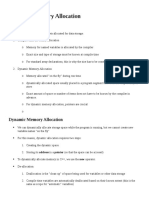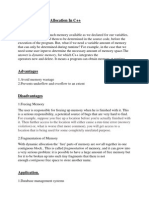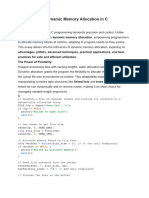0% found this document useful (0 votes)
16 views2 pagesStatic and Dynamic Memory
The document explains the differences between static and dynamic memory allocation in programming. Static memory allocation occurs at compile time with fixed sizes stored in the stack, while dynamic memory allocation happens at runtime with flexible sizes stored in the heap. It also highlights when to use each type and the importance of managing memory to avoid leaks and performance issues.
Uploaded by
kashmalaanwar123Copyright
© © All Rights Reserved
We take content rights seriously. If you suspect this is your content, claim it here.
Available Formats
Download as PDF, TXT or read online on Scribd
0% found this document useful (0 votes)
16 views2 pagesStatic and Dynamic Memory
The document explains the differences between static and dynamic memory allocation in programming. Static memory allocation occurs at compile time with fixed sizes stored in the stack, while dynamic memory allocation happens at runtime with flexible sizes stored in the heap. It also highlights when to use each type and the importance of managing memory to avoid leaks and performance issues.
Uploaded by
kashmalaanwar123Copyright
© © All Rights Reserved
We take content rights seriously. If you suspect this is your content, claim it here.
Available Formats
Download as PDF, TXT or read online on Scribd
/ 2


























































